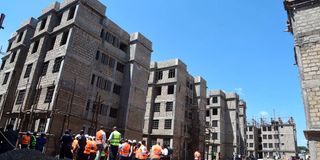
An excavator loads mounds of soil onto a tipper, for the construction of Bandaptai Street in Eldoret City, Uasin Gishu County to bitumen state on October 28, 2024.
On a hot Wednesday morning, Lydia Mutahi, the Local Project Co-ordinator at Capital Compass Group, in busy supervising the progress of a real estate project the company is undertaking in Malindi.
Located on a 16-acre piece of land that is 5 kilometers away from the Malindi International Airport, the project, dubbed Royal Tulia Gardens, seeks to appeal to the Kenyan diaspora market mainly.
“Whenever this group thinks about a holiday destination in Kenya, they think about the coast. Malindi was a better pick because it is not as congested as Mombasa. It is also accessible because of the airport,” Lydia said during an interview with DN2 Property.
Due to the challenges of investing in large urban centres, for instance market saturation, regulatory barriers, high cost of doing business among others, many investors have over the past couple of years been opting for alternative destinations in the counties.
Though not as robust as main urban centres such as Nairobi, Kisumu and Mombasa, these destinations offer several advantages that make up for the challenges.
For instance, whereas they may suffer from issues such as limited infrastructure development and shortage of skilled labour, Lydia says that they are not as congested as the major urban centres, which makes them appealing to customers.
Recover their money
“We are selling our apartments but we are also looking at the concept of AirBnB. No customer will want to vacation where there are 10 to15 other apartment blocks next to theirs as is the case in places like Nairobi or even Nyali,” said Lydia.
Compared to Mombasa which would have been the other option for them, the real estate practitioner points out that the demand for real estate in Malindi from their customers has been very encouraging.
“We started our project just recently, and already, it is almost 50 percent sold out,” she stated.
This, she projects, will enable them to recover their money faster than they would have had they invested in the more saturated markets, which will then enable them to put up more developments in the area.
“We intend to purchase more land to set up the second, third and fourth phases of the project, where we may do mixed use developments consisting of a conference facility, convenience stores, clinics, stand alone homes, among other developments,” said Lydia.
Due to proximity to the coast line which can be leveraged to import raw materials in bulk, Lydia adds that the cost of construction is also considerably lower in Kilifi.

A section of the Kapsuswa Affordable Housing Project in Kidiwa, Eldoret City, Uasin Gishu County on October 02, 2024.
“Most of the building materials are around us, the sand is not too far away, timber is also slightly cheaper than what you would find in Nairobi,” she explains.
Eager to see more development happening in their home counties, the real estate practitioner points out that both the residents and the local governments are also very supportive to investors from other counties.
“Even when we were looking for land to build on, we had a lot of help from the locals. We also received help from the county government when applying for approvals, which fast-tracked the construction process,” explains Lydia.
Having experienced limited growth over the years due to bottlenecks to investing, Gideon Mung’aro, who is the governor of Kilifi County, says that the county has had to issue incentives such as tax breaks to attract investors.
Development
“We recently set up the Kilifi Investment Corporation, whose mandate is to mobilise investment and promote the ease of doing business,” says Governor Mung’aro.
The county has also initiated a new department called ‘Donor Relations and Private Sector Coordination’ to see to it that all investors are handled with decorum and their concerns looked into with speed.
“When you come to the county, instead of going to the department of finance or trade, this team, headed by a lawyer, will help you to achieve what you want and quickly,” says Mr Mung’aro.
The governor adds that they have had to set up initiatives in partnership with the national government and private investors, to improve infrastructure and services.
With a 265 km beachline that is yet to be exploited, the opportunities for investing in hospitality real estate including hotels and private beach houses in the county are numerous.
“What has let the county down, however, is the fact that the largest plane you can land on the Malindi airport is a 90-seater,” says the governor, adding, “Now, there are negotiations between investors and the Kenya Airports Authority (KAA), to expand the airport so that we can start attracting direct flights into Kilifi. About Sh5.7 billion could be invested for this,” explains Mr Mung’aro.
The governor points out that the large number of investments taking place in the agriculture, mining and manufacturing sectors have resulted in an increase in the demand for housing, to accommodate workers.
“We have an organisation called Farm Africa, that wants to do major farming both on land and in the sea. There is also a group of investors from the US that will bring many women and youth groups here to do prawn farming. All these people will need housing,” Governor Mung’aro states.
From a cost perspective, the icing on the cake for developers and potential homeowners, is the hot weather in the county, which can be leveraged to generate solar power that is safer and cheaper.
“Kilifi is hot throughout the year even when it is raining, so there is opportunity in solar, when we have solar, we are able to reduce the cost of homes,” posed Mung’aro.
Kevin Mungai, who is the Land Business Unit Manager at SIC Investment Co-operative, says that other counties whose appeal to investors has increased include Homa Bay.
Over the past couple of years, the county has witnesssed numerous luxury developments, particularly in the upcoming town of Mbita.
“One benefit of investing in these counties compared to Nairobi is the lower cost of acquiring land and a higher potential for appreciation,” says Mungai.
According to the real estate practitioner, land in these counties tends to be significantly more affordable, which means that buyers and investors are able to buy the subdivided plots at a good price.
The rising demand for residential and commercial properties in these counties has been spurred by infrastructural growth. This in turn has seen tremendous appreciation in property prices, compared to Nairobi where values have plateaued.
“The other benefit of investing in these counties is the rapid urbanisation and infrastructural development,” says Mungai.
Since devolution was introduced, there has been accelerated infrastructure development which has created a demand for quality residential and commercial properties in these areas.
“These counties are becoming independent economic hubs, which increases demand for real estate, giving investors the chance to provide attractive investment and residential properties in newly urbanising areas,” says Mungai.
The real estate practitioner outlines the lifestyle appeal in these counties, as the other factor spurring real estate development, with the beautiful landscapes and recreation facilities attracting both buyers and investors.
“Counties such as Laikipia and Kajiado offer scenic views and ample green spaces, which appeal to residential investors seeking an escape from the hustle and bustle of city life,” remarkes Mungai.
Though the opportunities in these counties are without question, Mungai notes that there are still a number of factors affecting the cost of implementation, the pace, and the overall success of the projects.
Among the issues is speculative tendencies by land sellers that have pushed prices up and affected project budgets, particularly in counties such as Machakos, Kajiado and Kilifi, that are on demand.
“This often makes it a challenge to secure affordable land parcels, which forces investors to adjust their financial models or risk reduced returns,” explains Mungai.
Ownership disputes and inconsistent land titling have also emerged as challenges that investors encounter while investing in the counties. Some of these counties encounter complex land ownership issues, arising from contested ownership and overlapping land titles.
“These kinds of disputes often delay project implementation timelines and increase due diligence costs as investors must verify land authenticity and secure clean titles before proceeding with the acquisition,” explains Mungai.
Though a lot of progress has been made, lengthy and complex approval processes also continue to be a hurdle.
“Regulatory approval processes in certain counties are usually complicated, seen from the multiple layers of oversight, which sometimes require interaction with both county and national regulatory authorities,” says Mungai.
Lydia agrees, adding that navigating the legal framework for real estate investment in Kenya can be complex and time-consuming.
“The process of land acquisition, property registration, and obtaining necessary permits can be cumbersome. Instances of land disputes and fraudulent transactions add to the complexities, leading to potential delays and financial losses for investors,” poses Lydia.
Different counties also have different zoning regulations and building codes which might slow down the approval process.
Zoning code
“A county like Kajiado has a zoning code that limits the extent of subdivision of land, which might affect the kind of subdivision that an investor can implement,” explains Mungai.
Changes in county governments and political dynamics can also impact investment stability, especially when new county administrations change their stance on policies and development priorities.
“For instance, evolving tax policies and changes in licensing fees in some counties have impacted the financial viability of projects in these counties,” remarks Mungai.
Lydia also points out that corruption in lands departments at the county level remains a major issue that has served as a deterrent to real estate investors.
“Many Kenyans are losing their money to fraudsters taking advantage of loopholes in land policies. Such practices have eroded investor confidence, pushing them to invest elsewhere.”
Although the government has made significant strides in infrastructure development, there is still a shortage of serviced land in the country. With the absence of such facilities, developers have to install them at their own expense. The natural reaction for these developers is to pass that cost on to the consumers, which makes the houses expensive.
Inadequate infrastructure, including roads, electricity, and water supply, also affects project timelines and increases the cost of construction, which is already very high in Kenya due to fluctuating cost of construction materials and labour.
Shortage of skilled labour is also a challenge in the counties, which forces developers to bring in skilled labourers from Nairobi at an added cost and rely on locals mainly for casual labour.
“Working in a place that is as hot as Kilifi is different from working in a place with a controlled temperature like Nairobi, so it takes some adjusting for our staff from Nairobi. This of course affects project timelines,” explains Lydia.
She adds that projects in the counties also do not move as fast as they would want, therefore they have to adjust their schedules and try to strike a balance.
“Whenever you go to a new place, they have their way of doing things. In Nairobi we are used to doing things very fast, whereas in the counties things might just not go as fast as you would wish.”
In spite of these challenges, counties remain lucrative hubs for developers.












